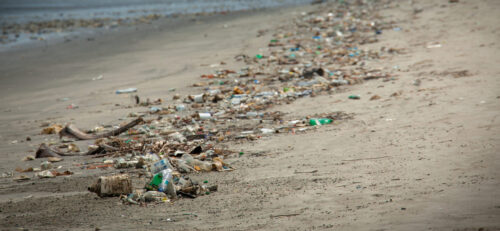Opinion: How marine debris impedes coastal tourism and economic development

This opinion was originally published on devex.
The tableau of turquoise waters and white sandy beaches has been driving tourist dollars to low- and middle-income countries for decades. However, a rising tide of marine debris threatens this critical driver of economic growth like never before.
Around the world, marine debris costs an estimated $13 billion a year, mainly through its adverse effect on fisheries, tourism, and biodiversity, according to Trucost, the research arm of Standard & Poor’s, a financial services company.
In Indonesia alone, the United Nations Environment Programme estimates that plastic pollution could adversely affect tourism, fisheries, and shipping sectors by as much as $1.3 billion.
If our work in international development has taught us anything, it’s that no matter where you live, marine debris is like a leaky faucet. You can call a plumber and fix the problem, or you can keep cleaning up after it forever. And when it comes to marine plastic, we need to fix the faucet by dealing with the waste before it reaches the sea.
To do so will require a solid waste management plan that allows tourism and economic development to flourish, without turning on new faucets of waste.
Despite international commitments to reduce waste at the Our Oceans Conference last November, there is still much work to be done. Solvents, fertilizers, toxic sludge, and other wastes entering coastal ecosystems have produced more than 400 marine “dead zones,” measuring over 245,000 square kilometers, a combined area greater than that of the United Kingdom. That is the equivalent of one garbage truck full of debris being dumped into the ocean every minute. Plastic particles have been found in hundreds of marine species, including fish and shellfish sold for human consumption.
Our work to improve the management of fisheries and marine resources allows us to see the scope of the problem firsthand. When we walk along the beaches in Bali or take the ferries from fishing ports, the beaches and bays are littered with garbage and debris. These are some of the lessons we’ve learned.
The importance of taking a holistic approach
Tetra Tech operates throughout Southeast Asia, Africa, and the Caribbean to support the development and management of marine biodiversity and sustainable fisheries through projects funded by the U.S. Agency for International Development. Our work takes us to places where it is critical to prevent pollution and marine debris from impacting the local communities.
Within our solid waste management group, we studied the problem of marine waste and determined that quick, focused action is essential to mitigate adverse economic impacts.
Moreover, marine waste is most prevalent in developing countries where money hasn’t traditionally been devoted to solid waste management. Tetra Tech is committed to attacking this problem in developing countries, with support from stakeholders worldwide.

